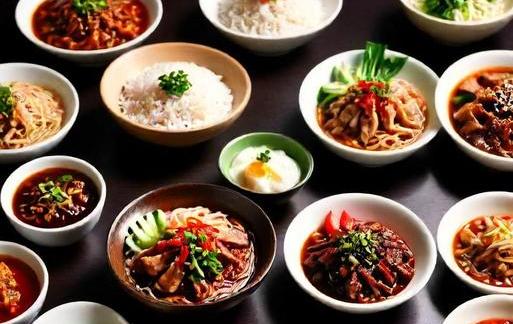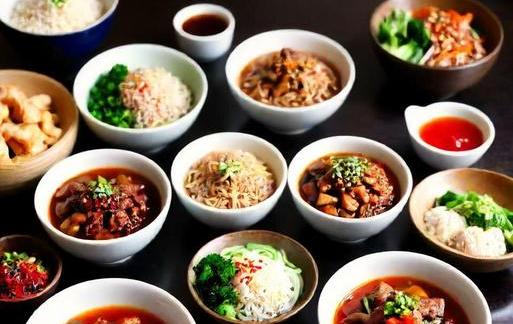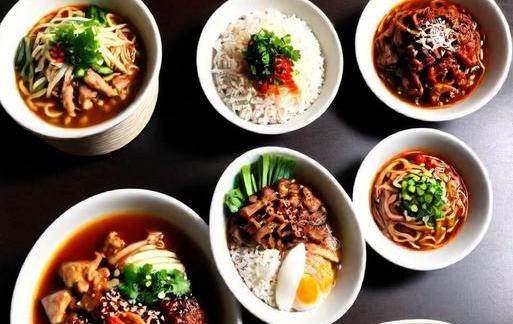- You are here:
- Home »
- Food
- » [REVEALED] Asian Foods That Start With U
[REVEALED] Asian Foods That Start With U
Note: This page contains affiliate links.
As an Amazon Associate, I earn from qualifying purchases when you click on the link, but you are not charged extra.
Asian cuisine is a rich tapestry of flavors, textures, and culinary traditions that have captivated the taste buds of food enthusiasts around the world. From spicy curries to delicate sushi, Asian cuisine offers a diverse range of dishes that reflect the region’s cultural diversity. In this article, we delve into the lesser-explored realm of Asian foods that start with the letter U. Despite the limited options, the uniqueness and delectability of these dishes contribute to the culinary mosaic of the continent.
Contents
List Of Asian Foods That Start With U

1. Ube
Description
Ube, a vibrant purple yam native to the Philippines, is a versatile ingredient used in both sweet and savory dishes. It boasts a subtly sweet flavor and a distinct purple hue, making it a visually appealing addition to various Asian desserts. Ube is often transformed into jam, ice cream, cakes, and even savory snacks. Its popularity has transcended the borders of the Philippines, with Ube-flavored treats gaining recognition worldwide.
Preparation
To prepare Ube, the tuberous roots are peeled, boiled, and mashed. The resulting vibrant purple mash can be incorporated into a myriad of recipes, adding both color and flavor.
2. Umami Burger
Description
While the concept of burgers is not inherently Asian, the Umami Burger brings a unique twist to this Western classic. Originating from Japan, the Umami Burger emphasizes the fifth basic taste, umami, which is known for its savory and rich flavor profile. This burger typically features a well-seasoned patty, topped with ingredients like shiitake mushrooms, miso glaze, and other umami-rich components.
Preparation
Creating the Umami Burger involves crafting a savory burger patty seasoned with umami-rich ingredients such as soy sauce, miso paste, and bonito flakes. The toppings are carefully chosen to enhance the overall umami experience.
3. Udon Noodles
Description
Udon noodles, a staple in Japanese cuisine, are thick wheat noodles with a chewy texture. These noodles are widely used in a variety of dishes, including soups, stir-fries, and hot pots. Udon noodles are known for their ability to absorb the flavors of the broth or sauce they are cooked in, making them a versatile and delicious component of many Japanese dishes.
Preparation
The preparation of Udon noodles involves mixing wheat flour, salt, and water to form a dough. The dough is then kneaded, rolled, and cut into thick noodles. These noodles are either boiled or added directly to soups and stir-fries for cooking.
4. Unagi
Description
Unagi, or freshwater eel, is a delicacy in Japanese cuisine. It is often grilled and glazed with a sweet soy-based sauce, imparting a rich and savory flavor to the tender eel meat. Unagi is commonly enjoyed as a sushi topping or served over a bed of rice, showcasing the Japanese mastery of balancing sweet and savory elements in their dishes.
Preparation
The preparation of Unagi involves filleting and grilling the eel. The glaze, typically made with soy sauce, mirin, and sugar, is applied during the grilling process, creating a caramelized coating on the eel.
5. Upma
Description
Originating from South India, Upma is a wholesome and savory porridge-like dish made from semolina or coarse rice flour. It is often flavored with mustard seeds, curry leaves, and various vegetables, providing a hearty and nutritious meal. Upma is a popular breakfast option and is enjoyed with chutney or a side of yogurt.
Preparation
To prepare Upma, semolina or rice flour is roasted until golden brown. It is then cooked with water or broth, and vegetables and spices are added for flavor. The result is a comforting and filling dish.
6. Ulam
Description
Ulam is a traditional Malay and Indonesian dish consisting of a variety of fresh raw herbs, vegetables, and sometimes seafood. It is typically served as a side dish to complement the main course. Ulam showcases the emphasis on freshness and simplicity in Malay and Indonesian culinary traditions, allowing diners to enjoy the natural flavors of the ingredients.
Preparation
The preparation of Ulam involves selecting a mix of fresh herbs, vegetables, and, if desired, seafood. These components are washed, sliced, and arranged on a plate, creating a visually appealing and flavorful side dish.
Exploring the lesser-known Asian foods that start with the letter U reveals a fascinating array of flavors and culinary techniques. From the versatile Ube to the savory Umami Burger, each dish contributes to the rich tapestry of Asian cuisine. Udon noodles, Unagi, Upma, and Ulam showcase the diversity and creativity embedded in the culinary traditions of various Asian countries. As global palates continue to expand, these unique Asian foods have the potential to gain recognition beyond their countries of origin. Whether you're a seasoned food enthusiast or a curious culinary explorer, trying these Asian delights promises a delicious journey into the heart of Asian gastronomy.
Significance

Asian cuisine is a rich tapestry of flavors, textures, and aromas that captivate food enthusiasts worldwide. Exploring the culinary delights of Asia unveils a diverse array of dishes, each with its unique ingredients and preparation methods. In this gastronomic journey, we delve into the lesser-known realm of Asian foods that start with the letter U. Uncover the culinary treasures that often escape the spotlight, yet contribute to the rich cultural mosaic of Asian cuisine.
Understanding the significance of foods that start with U in Asian culinary traditions requires a glimpse into the cultural and historical contexts that shape these dishes. While some may be region-specific, others might have transcended borders to become global favorites. These foods not only satisfy the palate but also serve as a testament to the cultural diversity that defines Asia.
Category-Related

1. Udon Noodles (Japan)
Udon noodles, a staple in Japanese cuisine, are thick wheat noodles that boast a chewy texture and absorb flavors exceptionally well. Typically served in a hot soy-based broth, udon noodles come with an array of accompaniments such as tempura, green onions, and seaweed. The versatility of udon noodles extends to various preparations, including stir-frying and cold salads.
2. Ulava Charu (India)
Hailing from the southern regions of India, Ulava Charu is a traditional soup made with horse gram. The dish is known for its robust flavor profile, combining the earthiness of horse gram with the tanginess of tamarind. Often seasoned with mustard seeds, cumin, and garlic, Ulava Charu is enjoyed with rice or Indian bread, making it a wholesome and nutritious option.
3. Urap (Indonesia)
Urap, a classic Indonesian dish, exemplifies the art of blending vegetables with a delectable coconut dressing. Comprising an assortment of steamed vegetables such as beans, spinach, and bean sprouts, urap is coated in a flavorful mixture of grated coconut, shallots, garlic, and lime leaves. This dish not only showcases the vibrant colors of Indonesia but also demonstrates the skillful use of spices.
4. Umami Omelette (China)
Umami Omelette, a popular dish in Chinese cuisine, elevates the humble omelette to a flavorful experience. Infused with umami-rich ingredients like mushrooms, soy sauce, and sometimes dried seafood, this omelette offers a savory and satisfying twist to the classic breakfast item. The incorporation of umami elements reflects the Chinese emphasis on achieving a harmonious balance of flavors.
Common Themes
Exploring Asian foods that start with U reveals some common themes that transcend borders and unify diverse culinary traditions. These themes not only enhance the gastronomic experience but also shed light on the shared cultural values that underpin Asian cuisines.
1. Umami Sensation
Across various Asian dishes, a common theme emerges – the pursuit of umami. Umami, often referred to as the fifth taste, embodies a savory, rich, and satisfying flavor. Many Asian cuisines, including Japanese, Chinese, and Indonesian, incorporate ingredients that impart umami, such as soy sauce, seaweed, and fermented products. The quest for umami represents a fundamental aspect of Asian culinary philosophy.
2. Vegetable Abundance
Vegetables play a central role in several Asian dishes that start with U. Whether it’s the diverse array of vegetables in Indonesian urap or the earthy horse gram in Indian Ulava Charu, there’s a common thread of celebrating the bounty of nature. This emphasis on vegetables not only adds nutritional value but also aligns with the holistic approach to food prevalent in many Asian cultures.
3. Balancing Textures
Asian cuisines masterfully balance textures, creating a sensory symphony with every bite. Udon noodles showcase this principle with their chewy consistency, providing a delightful contrast to the broth. Similarly, the crunch of fresh vegetables in urap complements the creamy texture of coconut dressing. The intentional juxtaposition of textures enhances the overall dining experience and is a hallmark of Asian culinary craftsmanship.
Interesting Facts
Delving deeper into the world of Asian foods that start with U unveils intriguing facts that add layers to our understanding of these culinary delights.
1. Ube: The Purple Yam Marvel (Philippines)
While not a dish but a key ingredient, Ube deserves a mention for its significance in Filipino cuisine. Ube, a vibrant purple yam, is used in various Filipino desserts, imparting a unique color and flavor. From Ube Halaya (a sweet jam) to Ube Ice Cream, this humble tuber has gained international popularity, introducing the world to the allure of Filipino sweets.
2. Unagi: The Japanese Eel Delicacy
Although not explicitly starting with U, Unagi, the Japanese term for freshwater eel, deserves a spotlight for its cultural and culinary importance. Grilled and glazed with a sweet soy-based sauce, Unagi is a delicacy often enjoyed during summer in Japan. This dish not only satisfies the taste buds but also carries symbolic significance, believed to provide stamina and endurance during the hot months.
3. Ulam: Malaysian Herb Salad Tradition
Ulam, a traditional Malaysian herb salad, showcases the emphasis on freshness and herbal flavors in Malaysian cuisine. Comprising a variety of raw herbs, vegetables, and sometimes grilled fish, Ulam is a refreshing and nutritious dish. Malaysians believe in the medicinal properties of the herbs used in Ulam, making it a staple in their culinary repertoire.
Conclusion
In conclusion, exploring Asian foods that start with U unravels a culinary tapestry rich in diversity, flavors, and cultural significance. From the comforting warmth of Udon noodles in Japan to the robust flavors of Ulava Charu in India, each dish tells a story of culinary craftsmanship passed down through generations. The common themes of umami pursuit, vegetable abundance, and texture balancing underscore the shared values that bind Asian cuisines.
As we savor the intriguing facts, such as the purple allure of Ube in Filipino desserts and the cultural symbolism of Unagi in Japan, we gain a deeper appreciation for the intricacies woven into these culinary creations. Asian cuisine, with its multitude of flavors and techniques, continues to captivate and inspire, inviting us to embark on a culinary journey that transcends borders and tantalizes the taste buds. So, the next time you seek a culinary adventure, consider exploring the world of Asian foods that start with U – a world where each bite is a celebration of culture, tradition, and the art of gastronomy.


